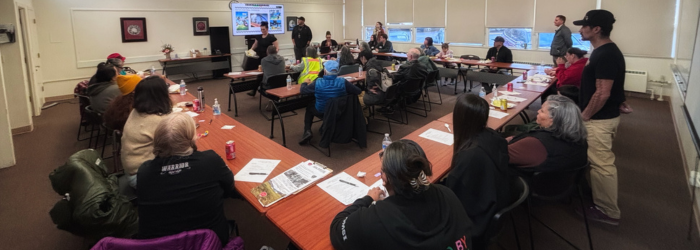Culturally Empowered and Civically Engaged Year-Round
The Portland Youth and Elders Council (PYEC) began as part of a regional effort to reduce poverty in urban Indian communities, to develop greater community ties and advocate for improving the quality of life for Native Americans in urban areas.
January’s PYEC meeting was a meaningful time for reflection and forward-looking conversations. It was a space to share updates on legislative sessions in Oregon and Washington, and to bring attention to the consensus of where our priorities stand as a community.
Additionally, participants received updates on NAYA’s vision to combat injustice, imbalance, and erasure through representation, expansion, and action in the Cultural Corridor. We learned that soon, a mosaic mural by artist Crystal Meneses will be installed as part of this Cultural Corridor project. People of all ages have been invited to contribute by creating small mosaic squares that will be incorporated into the final piece. Following the presentations, PYEC participants added their personal touch to an upcoming mosaic art installation by creating their own mosaic pieces.
PYEC meets every other month on the second Saturday of the month. The next meeting is March 8, 2025, so make plans now to join.
Civic engagement extends beyond voting—it includes staying informed, speaking out on critical issues, and supporting leaders who prioritize Native needs. A recent survey from NAYA’s Policy, Advocacy, and Civic Engagement team identified housing, behavioral health, education, and economic development as top concerns for Native communities. These issues require sustained advocacy.
Voting rights were also a major concern, with many community members feeling disconnected from the political process due to barriers like access to polling locations and mistrust in the system. This highlights the need to create more opportunities for Native voices to be heard at all levels of government.
Local and state elections are just as important as presidential elections, as they directly influence policies on healthcare, housing, education, and economic development. These decisions often have a more immediate impact on Native communities.
At NAYA, we foster year-round civic engagement. Our Policy 101 and Testimony 101 workshops equip community members with the tools to effectively participate in policymaking. We also organize visits with state representatives, giving Native voices the chance to be heard directly by lawmakers.
Survey results show that the following issues need continued engagement:
- Housing: Rising housing costs and lack of affordable housing are urgent issues. Advocacy for affordable housing initiatives can help address these challenges.
- Behavioral Health: Culturally relevant mental health services are critical but underfunded. NAYA advocates for the expansion of these services to better support Native individuals and families.
- Education: Ensuring access to quality education for Native youth is key. Advocacy can help secure better resources for Native students.
- Economic Development: Supporting Native entrepreneurs and creating job opportunities are crucial for long-term economic empowerment.
Get Involved: Native Day of Action
We offer ongoing opportunities for community members to engage in advocacy, including Policy 101 workshops and Native Days of Action. This year, NAYA is partnering with other Native organizations to host the first-ever collective Native Day of Action. This event will unite Native communities across the country to advocate for critical issues, with training to ensure participants can effectively engage with lawmakers.
At NAYA, we believe in the power of leadership, accountability, and community. Our core values call us to stay engaged year-round, advocating for our families and communities. Whether you’re registering to vote, attending a workshop, or joining Native Days of Action, there are many ways to make a difference.
Mark your calendars for NAYA’s upcoming events:
- Training Day: March 11
- Lobby Day: March 13
These events will train participants in lobbying and engaging with state legislators to ensure Native voices are heard at the state capitol.
The PACE team’s Community Priority survey gathers input year-round, and any current submissions will help influence the 2026 legislative session.
By participating, you contribute to a movement that ensures Native communities are represented and supported year-round. Together, we can create a future where Native communities thrive.
